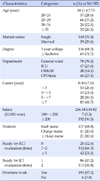Abstract
Purpose
This study was done to identify the relationships of perception of JCI (Joint Commission International) hospital accreditation, nursing performance, self-concept and retention intention in nurses.
Methods
Self-administered questionnaires were used to collect data from 199 JCI-accredited nurses in general hospitals located in Gyeonggi Province. Data collection was done in May 2015 and analyzed using t-test, ANOVA, Scheffé's test, and Pearson correlation coefficients.
Results
The scores for perception, and nursing performance were (on a five-point Likert scale) 3.34, 3.78 respectively, and self-concept and retention intention were (on a eight-point Likert scale) 5.40 and 5.21 respectively. Nurses' perception, nursing performance, self-concept, and retention intention showed significant differences depending on age, marital status, education, department, work experience, position, Korean accreditation, and JCI accreditation. A positive correlation was observed between perception, nursing performance, self-concept, and retention intention.
Figures and Tables
References
1. Kim SM. A study on effects of the joint commission international (JCI) review on the awareness and attitude of hospital employees [master's thesis]. Seoul: Catholic University;2012.
2. Joint Commission International. JCI accreditation [Internet]. cited 2015 June 16. Available from: http://ko.jointcommissioninternational.org/enko/.
3. Yang NY, Choi JS. Relationships of nurses's perception, nursing performance, job stress, and burnout in relation to the Joint commission international hospital accreditation. J Korean Acad Nurs Adm. 2014; 20(1):1–9. DOI: 10.11111/jkana.2014.20.1.1.
4. Choi YS. Effect of nurses' awareness on medical institution evaluation on nursing performance [master's thesis]. Seoul: The Catholic University of Korea;2011.
5. El-Jardali F, Jamal D, Dimass H, Ammar W, Tchaghchaghian V. The impact of hospital accreditation on quality of care: Perception of Lebanese nurses. Int J Qual Health Care. 2007; 20(5):363–371. DOI: 10.1093/intqhc/mzn023.
6. Mead N, Bower P, Roland M. The general practice assessment questionnaire (GPAQ) - Development and psychometric characteristics. BMC Fam Pract. 2008; 9:13. DOI: 10.1186/1471-2296-9-13.
7. Smith EL, Cronewett L, Sherwood S. Current assessment of quality and safety education in nursing. Nurs Outlook. 2007; 55(3):132–137. DOI: 10.1016/j.outlook.2007.02.005.
8. Yoo MS, Chung MS. The relationships among the perception of quality assurance and national hospital evaluation program and nursing performance of hospital nurses. J Korean Acad Nurs Adm. 2008; 14(3):260–278.
9. Hampton GM, Hampton DL. Relationship of professionalism, rewards, market orientation and job satisfaction among medical professionals: the case of certified nurse-midwives. J Bus Res. 2004; 57:1042–1053. DOI: 10.1016/s0148-2963(02)00356-9.
10. Kwon KJ, Ko KH, Kim KW, Kim JA. The impact of nursing professionalism on nursing performance and retention intention among psychiatric mental health nurses. J Korean Acad Nurs Adm. 2010; 16(3):229–239. DOI: 10.11111/jkana.2010.16.3.229.
11. Han SJ. Effects of self concept on clinical competency in hospital nurses. J Korean Acad Adult Nurs. 2007; 19(2):274–289.
12. Kettinger Geiger JW, Davit JS. Self-image and job satisfaction in varied settings. Nurs Manage. 1988; 19(12):50–56. 58
13. Cowin L. Effects on nurses' job satisfaction on retention. J Nurs Adm. 2002; 32:282–291. DOI: 10.1097/00005110-200205000-00008.
14. Sung MH, Choi EY. The relationships between professional self-concept, nursing performance and retention intention of emergency department nurses. J Korean Acad Fundam Nurs. 2012; 19(2):244–252. DOI: 10.7739/jkafn.2012.19.2.244.
15. Kim MJ. The Effect of nursing organizational culture on nurses' intention of retention [master's thesis]. Seoul: Hanyang University;2006.
16. Andrews DR, Bushy A. Nurses self-concept and perceived quality of care-a narrative analysis. J Nurs Care Qual. 2011; 26(1):69–77. DOI: 10.1097/ncq.0b013e3181e6f3b9.
17. Kwon KJ, Chu MS, Kim JA. The impact of nursing professionalism on nursing performance, job satisfaction and retention intention among clinical nurses. J Korean Acad Nurs Adm. 2009; 15(2):182–192.
18. Park SA. An exploratory study on the relationship between leadership style and performance in Korean nursing units [dissertation]. Seoul: Seoul National University;1988. 93.
19. Cowin LS, Hengstberger-sims C. New graduate nurse self-concept and retention: a longitudinal survey. Int J Nurs Stud. 2006; 59–70. DOI: 10.1016/j.ijnurstu.2005.03.004.
20. Jeong HY. Relationship between job characteristics, internal customer satisfaction and nurses' retention of experienced nurses [master's thesis]. Seoul: Yonsei University;2013.
21. Sung MH, Oh MO. The relationships of professional selfconcept, role conflict and job satisfaction on emergency department nurses. J Korean Acad Fundam Nurs. 2011; 18(1):107–115.
22. Kim KH. Relationship among nurse perception of accreditation, nursing practice environment and professional self-concept in an accredited healthcare system [master's thesis]. Seoul: Yonsei University;2012.
23. Choi SO, Kim JH. Relationships among job stress, nursing performance, and retention intention of clinical nurses. J Korean Public Health Nurs. 2013; 27(1):142–152. DOI: 10.5932/jkphn.2013.27.1.142.
24. Andrews DR, Bushy A. Nurses self-concept and perceived quality of care-a narrative analysis. J Nurs Care Qual. 2011; 26(1):69–77. DOI: 10.1097/ncq.0b013e3181e6f3b9.
25. Leddy S, Pepper JM. Conceptual bases of professional nursing. Philadelphia: Lippincott Co;1985. DOI: 10.1097/00000446-198512000-00063.




 PDF
PDF ePub
ePub Citation
Citation Print
Print






 XML Download
XML Download